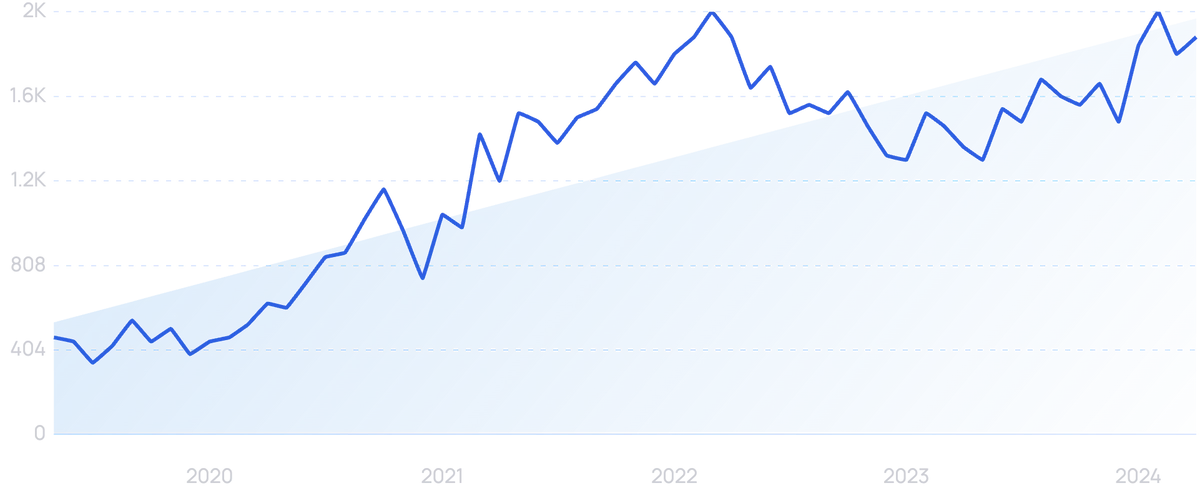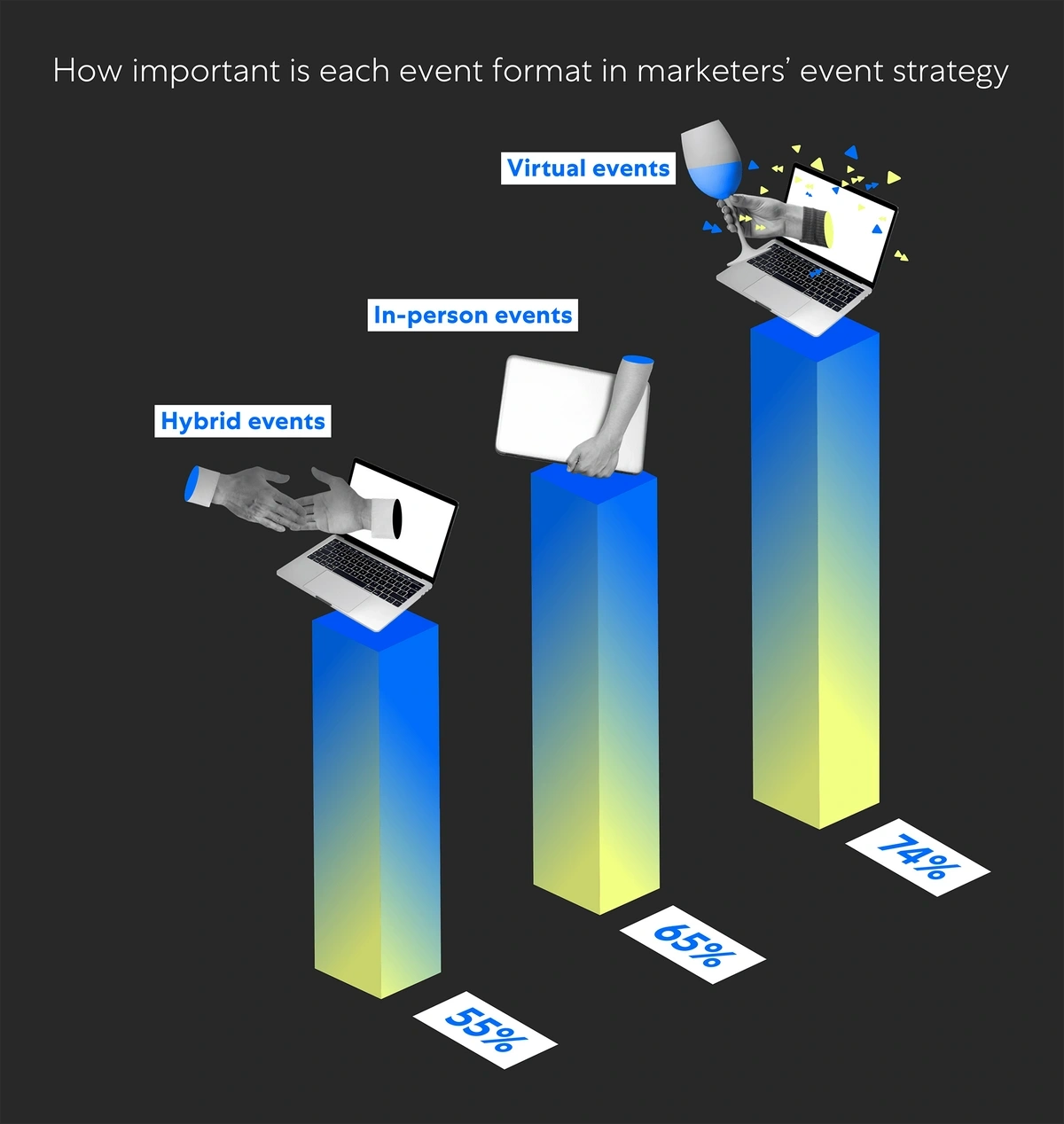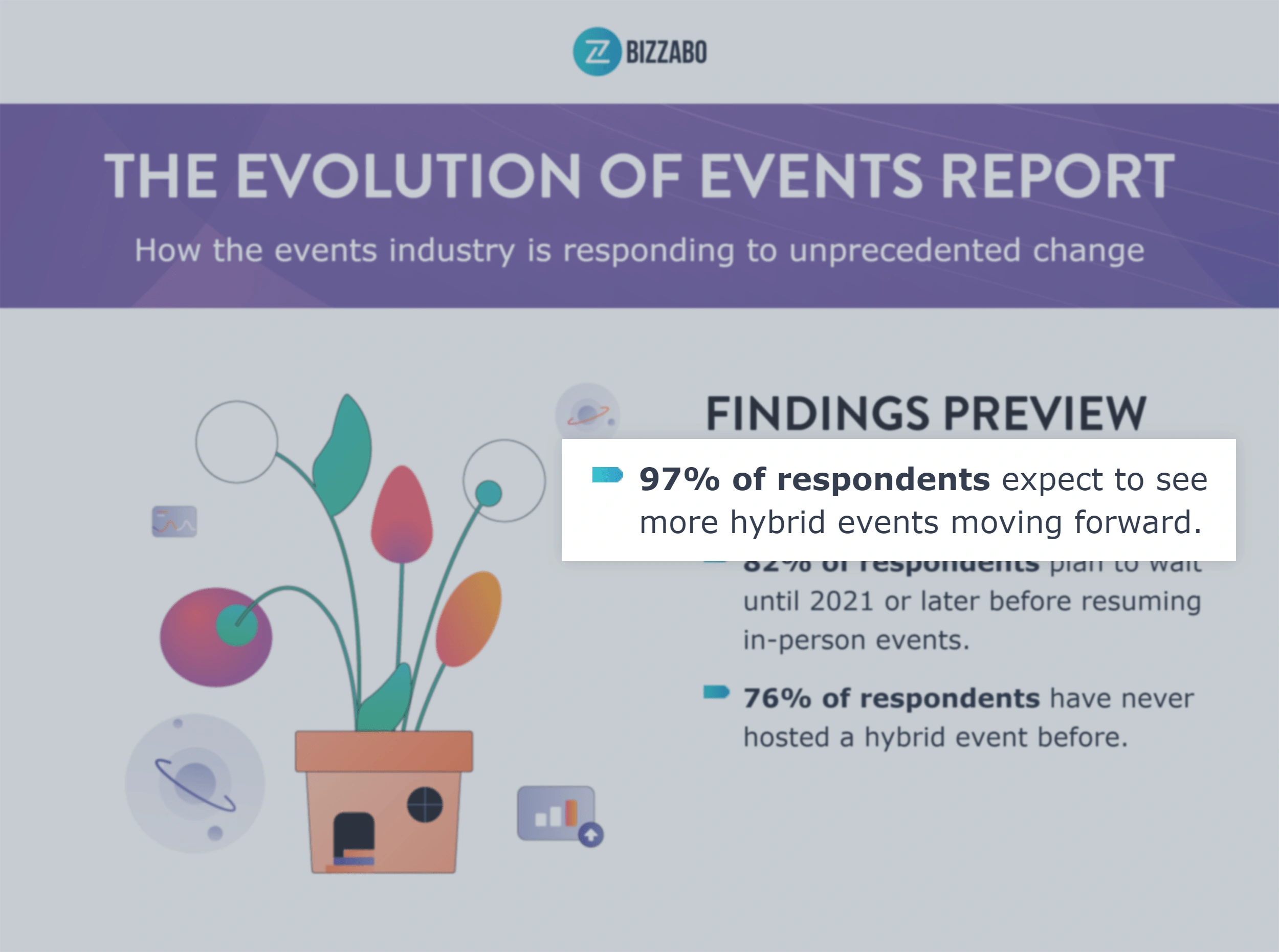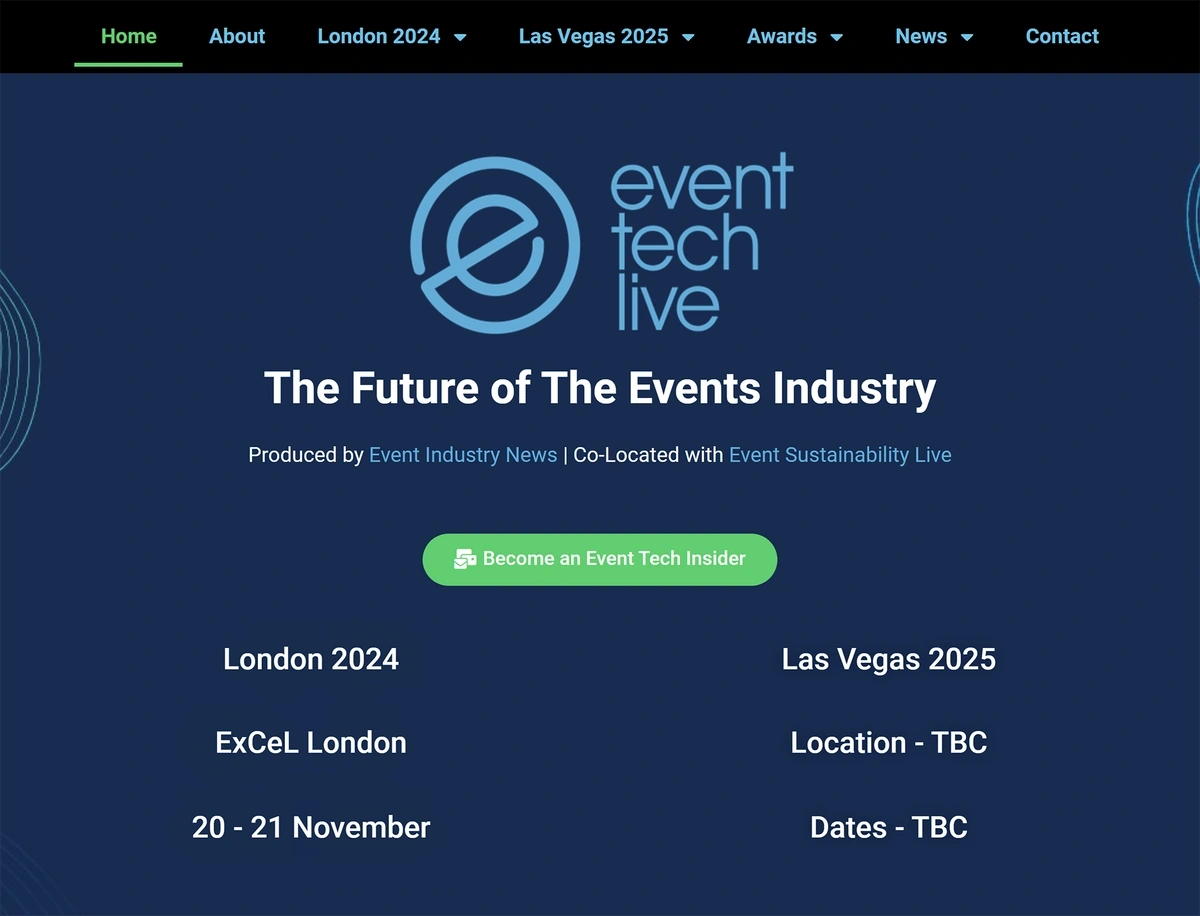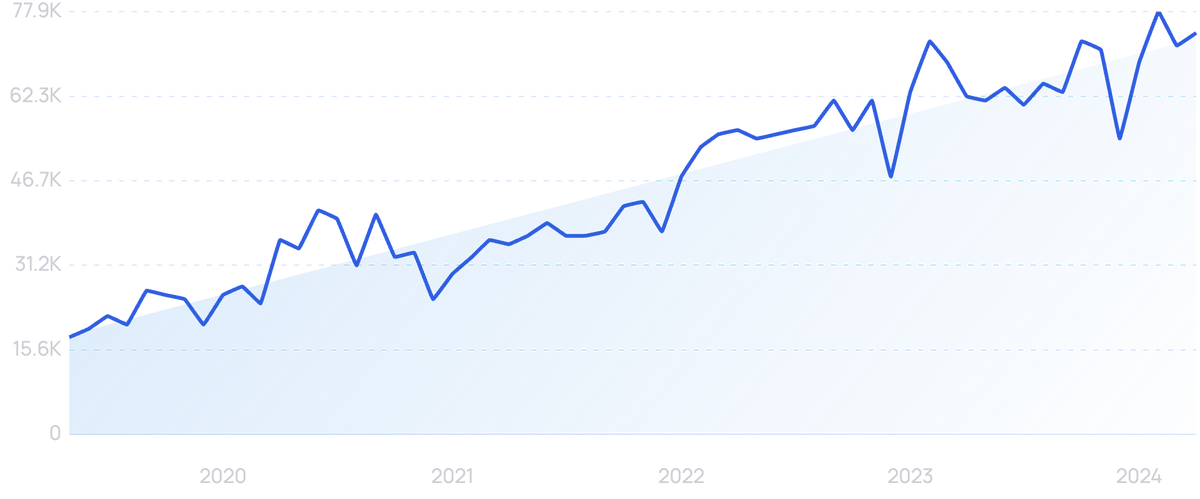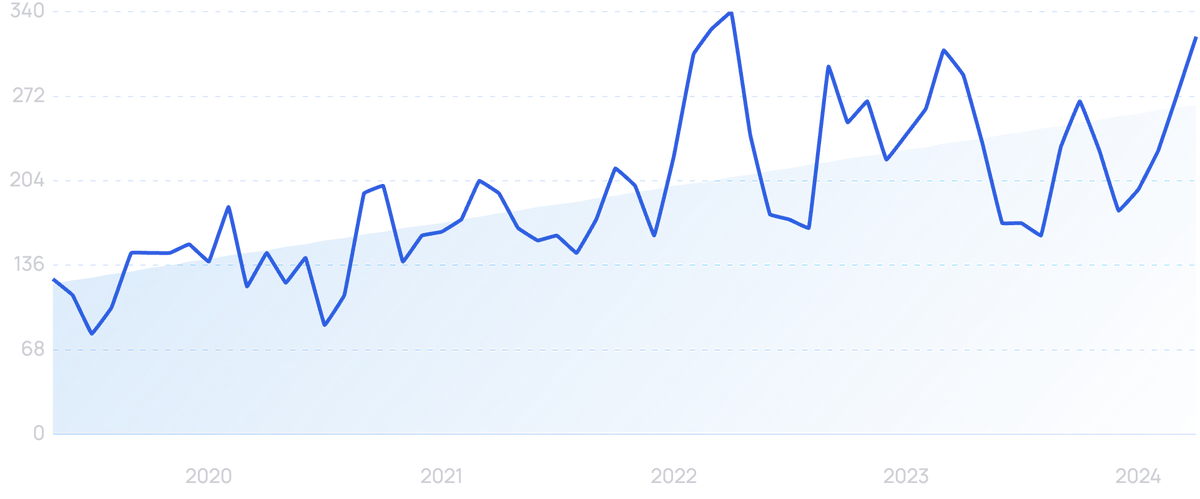Get Advanced Insights on Any Topic
Discover Trends 12+ Months Before Everyone Else
How We Find Trends Before They Take Off
Exploding Topics’ advanced algorithm monitors millions of unstructured data points to spot trends early on.

Keyword Research
Performance Tracking
Competitor Intelligence
Fix Your Site’s SEO Issues in 30 Seconds
Find technical issues blocking search visibility. Get prioritized, actionable fixes in seconds.
Powered by data from
7 Top Event Industry Trends (2024)
You may also like:
From AR/VR to hybrid events, the event space undergoing major shifts.
Despite this, the event industry is expected to experience a CAGR of 6.4%until 2032.
Keep reading to learn about 8 rapidly changing event industry trends for 2024 and beyond.
1. Hybrid events continue to grow
Searches for “hybrid event” have increased 309% in the last 5 years.
Though event organizers are increasingly organizing in-person events, it’s likely that virtual is here to stay.
If not completely, at least as a part of a new hybrid event model.
One survey found that over half of event organizers and CMOs consider hybrid events and important part of their strategy.
The vast majority of event businesses consider hybrid events nearly as important as in-person.
Event management solution Bizzabo conducted a survey of industry professionals and found that 97% of respondents expect to see more hybrid events going forward.
Nearly all event professionals believe the popularity of hybrid events will grow in the near future.
Hybrid events allow for the flexibility and reach of a virtual event, but the connection and engagement of an in-person option.
For example, Hopin, a virtual event platform launched a hybrid event product has secured $1B in funding to date.
As hybrid events become more common, what exactly do they look like?
In some cases, hybrid events may take place primarily online but offer upgrade packages for an in-person meetup.
Event Tech Live is one such event that is designed mainly around virtual access but reintroduces a live element with two live stages.
Event Tech Live offers a combination of virtual talks and in-person, live events.
Others, like the World Travel & Tourism Council’s Global Summit in April, are primarily in-person, with the content also made available online.
The hybrid event outlook for the next year or two will likely include many different configurations of in-person and virtual offerings. You can see this blend of events in our list of marketing conferences for 2025.
2. Events become an important PR tool
In his State of the Industry presentation, founder and executive director of the Event Leadership Institute Howard Givner predicts that corporate events will shift “From [a] revenue source to [a] marketing vehicle”.
There’s no limit to the number of virtual attendees that can gain access to an online event.
So in this way, online events have become a form of mass communication akin to PR.
Which is why 80% of organizers are now offering free registration for their events.
Take an example from the search industry. BrightonSEO, one of the world's biggest SEO conferences, gives away thousands of free tickets via a ballot.
As the reach of events expands, the messaging will likely change to accommodate a less niche audience at the top of the sales funnel.
Making tickets free also means that the profitability of events has decreased.
However, some of this loss can be recouped via sponsorship revenue.
To meet the demand for virtual event sponsorships, platforms like Bizzabo have arisen, which offers easy-to-use sponsor profiles and data that makes it easier to secure sponsorships.
3. Events enter a year-round event cycle
Major companies have, in the past, typically held one yearly conference or event.
Now that smaller virtual events are becoming more common, events can be put on more often.
And the conversations they spark can continue online for years to come, blurring the line between one "event" and the next.
Webit, a yearly tech and innovation festival, transitioned to a Global Virtual Platform that hosts 12 events a month, with a reach of 250,000 attendees.
The tech has responded to this shift with many event platforms now offering an ongoing community feature.
For example, the event platform Pathable allows companies to create landing pages that offer year-round content and community.
With features to meet this trend, it’s no surprise that this platform is seeing a surge in interest.
4. Professionals use events to help them upskill
The rapid changes in the events industry called for changes in structure, technology, and professional skills which will continue to emerge in the next year.
To keep up with the changes, professionals are upskilling.
Searches for “upskilling” have increased 313% in the last 5 years.
When surveyed, 85% of event planning professionals said they wanted to learn to develop their skills in designing live experiences.
As a response to this gap in skills, the Event Leadership Institute has released several new certifications in areas like "Event Accessibility Strategist" and "Enhancing Events with AI"
The need for event professionals to adapt their skills will likely continue through 2024 and beyond.
5. Emphasis on transformational experiences
The total disruption of the event industry in 2020/2021 called into question the purpose of events in society as a whole.
“The pandemic has introduced a new concept to our thought-matrix: Is this essential? In other words, is it worth it?” Says Teeg Stouffer, Co-founder of the American Association of Event Professionals.
As 68% of marketers believe it is harder to provide networking opportunities in the virtual world, the unique value proposition of events is now the people you meet and the things you are able to experience.
Even before the pandemic, events were already shifting away from a focus on content to experience.
During Bizzabo’s event industry summit the improv hip-hop group North Coast performed a set that involved audience members virtually to maximize the engaging experience.
We will likely see this trend develop further, as people need meaningful, transformative experiences to feel something is worth it.
Searches for “transformation economy” have grown by 154% over the last 5 years.
Corporate event industry news source Event MB asserted a new order of priorities in 2021:
- Meaningful connection
- Entertainment
- Content
In conferences and events, the desire for a transformational experience means that content may no longer be the biggest priority.
6. More data collection during and after events
Big data can help event planners meet rapidly changing consumer expectations.
Chris Cavanaugh, CFO at Freeman, a leading brand experience company, says that for events to survive “data will be the key to helping us stay a step ahead of [the customer’s] wants, needs, and intentions. And if we fail to harness data to understand them, someone else will take our audience from us”.
In a similar way tracking RFID badges works in a real environment, in a virtual event, tracking clicks, how long a user remains in a presentation, and even who they interact with can provide companies valuable insights into who their target demographic is and what they want.
One major driving force behind data collection is the struggle for online engagement.
After a couple of years of living virtually, many experienced “zoom fatigue”, or mental exhaustion felt after hours of virtual communication.
Currently, research indicates that only 42% of all attendees watch the entirety of a virtual session.
The industry knows that an entirely virtual event is not ideal – yet it is likely a long way off from finding the right alternative to in-person events.
Real-time data collection will be the main tool to bridge the gap between where events are, and where they should be.
7. Increasing investments in event technology
40% of event planners are unsatisfied with the tech options available to them.
It’s been said that the pandemic condensed years worth of change into months.
The result is that technology is lagging far behind the demand – but it’s going to catch up.
Which is why we're seeing significant VC funding in event tech startups.
Startups in the event space have been making headlines for their huge valuations.
Hopin has raised a whopping $1B to date.
This is in part due to its meteoric rise in users: The platform began with 1,800 users and rose to 80,000 in one year.
Welcome transitioned from restaurant software to a virtual events platform and secured $6 million.
While, Wave, a virtual concert company raised $30 million.
Event tech will likely continue to thrive as the tech boom continues through 2024 and beyond.
Conclusion
That concludes our list of the top trends impacting the event and meeting space.
Event tech will likely continue to proliferate in 2024 and beyond.
And whether they happen online, offline, or in a hybrid model, events that remain flexible and prioritize memorable experiences will likely become the norm.
Stop Guessing, Start Growing 🚀
Use real-time topic data to create content that resonates and brings results.
Exploding Topics is owned by Semrush. Our mission is to provide accurate data and expert insights on emerging trends. Unless otherwise noted, this page’s content was written by either an employee or a paid contractor of Semrush Inc.
Share
Newsletter Signup
By clicking “Subscribe” you agree to Semrush Privacy Policy and consent to Semrush using your contact data for newsletter purposes
Written By


Josh is the Co-Founder and CTO of Exploding Topics. Josh has led Exploding Topics product development from the first line of co... Read more




